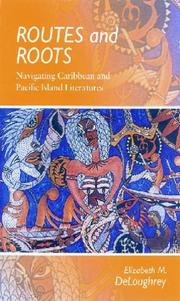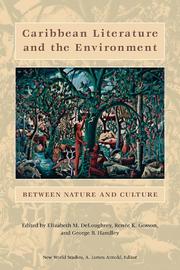| Listing 1 - 8 of 8 |
Sort by
|

ISBN: 9780824831226 0824831225 0824834720 0824864182 1435666542 1441671528 Year: 2007 Publisher: Honolulu: University of Hawai'i Press,
Abstract | Keywords | Export | Availability | Bookmark
 Loading...
Loading...Choose an application
- Reference Manager
- EndNote
- RefWorks (Direct export to RefWorks)
"Routes and Roots" is the first comparative study of Caribbean and Pacific Island literatures and the first work to bring indigenous and diaspora literary studies together in a sustained dialogue. Taking the "tidalectic" between land and sea as a dynamic starting point, Elizabeth DeLoughrey foregrounds geography and history in her exploration of how island writers inscribe the complex relation between routes and roots. The first section looks at the sea as history in literatures of the Atlantic middle passage and Pacific Island voyaging, theorizing the transoceanic imaginary. The second section turns to the land to examine indigenous epistemologies in nation-building literatures. Both sections are particularly attentive to the ways in which the metaphors of routes and roots are gendered, exploring how masculine travelers are naturalized through their voyages across feminized lands and seas. This methodology of charting transoceanic migration and landfall helps elucidate how theories and people travel, positioning island cultures in the world historical process. In fact, DeLoughrey demonstrates how these tropical island cultures helped constitute the very metropoles that deemed them peripheral to modernity. Fresh in its ideas, original in its approach, "Routes and Roots" engages broadly with history, anthropology, and feminist, postcolonial, Caribbean, and Pacific literary and cultural studies. It productively traverses diaspora and indigenous studies in a way that will facilitate broader discussion between these often segregated disciplines.
Caribbean literature --- Pacific Island literature --- History and criticism --- Caribbean literature - 20th century - History and criticism --- Pacific Island literature - 20th century - History and criticism --- Littérature caribéenne --- Littérature océanienne --- 20e siècle --- Histoire et critique
Book
ISBN: 1478004711 9781478004714 147800410X 1478005580 9781478004103 1478090022 9781478090021 9781478005582 Year: 2019 Publisher: Duke University Press
Abstract | Keywords | Export | Availability | Bookmark
 Loading...
Loading...Choose an application
- Reference Manager
- EndNote
- RefWorks (Direct export to RefWorks)
In 'Allegories of the Anthropocene' Elizabeth M. DeLoughrey traces how indigenous and postcolonial peoples in the Caribbean and Pacific Islands grapple with the enormity of colonialism and anthropogenic climate change through art, poetry, and literature. In these works, authors and artists use allegory as a means to understand the multiscalar complexities of the Anthropocene and to critique the violence of capitalism, militarism, and the postcolonial state. DeLoughrey examines the work of a wide range of artists and writers-including poets Kamau Brathwaite and Kathy Jetnil-Kijiner, Dominican installation artist Tony Capellan, and authors Keri Hulme and Erna Brodber-whose work addresses Caribbean plantations, irradiated Pacific atolls, global flows of waste, and allegorical representations of the ocean and the island. In examining how island writers and artists address the experience of finding themselves at the forefront of the existential threat posed by climate change, DeLoughrey demonstrates how the Anthropocene and empire are mutually constitutive and establishes the vital importance of allegorical art and literature in understanding our global environmental crisis.
Climatic changes --- Climatic changes in literature. --- Human ecology in art. --- Caribbean literature --- Pacific Island literature --- Art, Caribbean --- Art, Pacific Island --- Postcolonialism in literature. --- Postcolonialism and the arts. --- Effect of human beings on. --- Themes, motives. --- Social aspects --- Climatic changes in art --- Changes, Climatic --- Changes in climate --- Climate change --- Climate change science --- Climate changes --- Climate variations --- Climatic change --- Climatic fluctuations --- Climatic variations --- Global climate changes --- Global climatic changes --- Climatology --- Climate change mitigation --- Teleconnections (Climatology) --- Arts and postcolonialism --- Arts --- Pacific Island art --- Caribbean art --- Oceanian literature --- Anthropogenic effects on climatic changes --- Human ecology --- Environmental aspects --- Global environmental change --- anthropocene --- environmental humanities --- blue humanities --- climate change --- postcolonial studies
Book
Year: 2010 Publisher: Honolulu : University of Hawai'i Press,
Abstract | Keywords | Export | Availability | Bookmark
 Loading...
Loading...Choose an application
- Reference Manager
- EndNote
- RefWorks (Direct export to RefWorks)
Caribbean literature --- Caribische letterkunde --- Pacific Island literature --- Pacifieke eilanden --- History and criticism --- Geschiedenis en kritiek. --- Letterkunde
Book
ISBN: 9780195394429 9780195394436 0195394429 Year: 2011 Publisher: New York: Oxford university press,
Abstract | Keywords | Export | Availability | Bookmark
 Loading...
Loading...Choose an application
- Reference Manager
- EndNote
- RefWorks (Direct export to RefWorks)
Commonwealth literature (English) --- Ecology in literature --- Human ecology in literature --- Postcolonialism in literature --- Ecocriticism --- History and criticism --- Ecology in literature. --- Human ecology in literature. --- Postcolonialism in literature. --- Ecocriticism. --- History and criticism. --- Écologie --- Postcolonialisme --- Littérature anglophone --- Écocritique --- Dans la littérature --- Histoire et critique --- Écologie --- Littérature anglophone --- Écocritique --- Dans la littérature
Book
ISBN: 0190252804 1283097818 9786613097811 0199742561 0195394429 0195394437 9780199742561 9780195394429 9780195394436 9780190252809 9781283097819 6613097810 0199792739 9780199792733 Year: 2011 Publisher: New York Oxford University Press
Abstract | Keywords | Export | Availability | Bookmark
 Loading...
Loading...Choose an application
- Reference Manager
- EndNote
- RefWorks (Direct export to RefWorks)
This is the first collection to bring environmental issues into a dialogue with postcolonial studies. By examining African, Caribbean, Pacific Island and South Asian literatures and how they depict the relationship between humans and nature, Postcolonial Ecologies makes a compelling argument for a more global approach to thinking through our current environmental crisis.
Commonwealth literature (English) --- Ecology in literature. --- Human ecology in literature. --- Postcolonialism in literature. --- Ecocriticism. --- History and criticism. --- Ecological literary criticism --- Environmental literary criticism --- Criticism --- Commonwealth literature (English) - History and criticism --- Ecology in literature --- Human ecology in literature --- Postcolonialism in literature --- Ecocriticism
Book
ISBN: 9781138827721 113882772X 9781315738635 9781317574293 9781317574309 9781138235816 Year: 2015 Publisher: New York ; London : Routledge,
Abstract | Keywords | Export | Availability | Bookmark
 Loading...
Loading...Choose an application
- Reference Manager
- EndNote
- RefWorks (Direct export to RefWorks)
This book examines current trends in scholarly thinking about the new field of the Environmental Humanities, focusing in particular on how the history of globalization and imperialism represents a special challenge to the representation of environmental issues. Essays in this path-breaking collection examine the role that narrative, visual, and aesthetic forms can play in drawing attention to and shaping our ideas about long-term and catastrophic environmental challenges such as climate change, militarism, deforestation, the pollution and management of the global commons, petrocapitalism, and the commodification of nature.
Ecocriticism. --- Environmentalism in literature. --- Postcolonialism in literature. --- Human ecology in literature. --- Postcolonialism in literature --- Ecology --- Ecocriticism
Book
ISBN: 1315738635 1317574303 Year: 2015 Publisher: New York : Routledge,
Abstract | Keywords | Export | Availability | Bookmark
 Loading...
Loading...Choose an application
- Reference Manager
- EndNote
- RefWorks (Direct export to RefWorks)
This book examines current trends in scholarly thinking about the new field of the Environmental Humanities, focusing in particular on how the history of globalization and imperialism represents a special challenge to the representation of environmental issues. Essays in this path-breaking collection examine the role that narrative, visual, and aesthetic forms can play in drawing attention to and shaping our ideas about long-term and catastrophic environmental challenges such as climate change, militarism, deforestation, the pollution and management of the global commons, petrocapitalism, and the commodification of nature. The volume presents a postcolonial approach to the environmental humanities, especially in conjunction with current thinking in areas such as political ecology and environmental justice. Spanning regions such as Africa, Asia, Eastern Europe, Latin America and the Caribbean, Australasia and the Pacific, as well as North America, the volume includes essays by founding figures in the field as well as new scholars, providing vital new interdisciplinary perspectives on: the politics of the earth; disaster, vulnerability, and resilience; political ecologies and environmental justice; world ecologies; and the Anthropocene. In engaging critical ecologies, the volume poses a postcolonial environmental humanities for the twenty-first century. At the heart of this is a conviction that a thoroughly global, postcolonial, and comparative approach is essential to defining the emergent field of the environmental humanities, and that this field has much to offer in understanding critical issues surrounding the creation of alternative ecological futures.

ISBN: 9780813923727 0813923735 9780813923734 0813923727 Year: 2005 Publisher: Charlottesville: University of Virginia press,
Abstract | Keywords | Export | Availability | Bookmark
 Loading...
Loading...Choose an application
- Reference Manager
- EndNote
- RefWorks (Direct export to RefWorks)
Perhaps there is no other region in the world that has been more radically altered in terms of human and botanic migration, transplantation, and settlement than the Caribbean. Theorists such as Edouard Glissant argue that the dialectic between Caribbean "nature" and "culture," engendered by this unique and troubled history, has not heretofore been brought into productive relation. "Caribbean Literature and the Environment" redresses this omission by gathering together eighteen essays that consider the relationship between human and natural history. The result is the first volume to examine the literatures of the Caribbean from an ecocritical perspective in all language areas of the region. In its exploration of the relationship between nature and culture, this collection focuses on four overlapping themes: how Caribbean texts inscribe the environmental impact of colonial and plantation economies; how colonial myths of edenic and natural origins are revisioned; what the connections are between histories of biotic and cultural creolization; and how a Caribbean aesthetics might usefully articulate a means to preserve sustainability in the context of tourism and globalization. By creating a dialogue between the growing field of ecological literary studies, which has primarily been concerned with white settler narratives, and Caribbean cultural production, especially the region's negotiation of complex racial and ethnic legacies, these essays explore the ways in which the history of transplantation and settlement has provided unique challenges and opportunities for establishing a sense of place and an environmental ethic in the Caribbean. The volume includes an extensive introduction by the editors and essays by Antonio Benitez-Rojo, Derek Walcott, Wilson Harris, Cyril Dabydeen, Helen Tiffen, Hena Maes-Jelinek, and Lizabeth Paravisini-Gebert, among others, as well as interviews with Walcott and Raphael Confiant.
Caribbean literature - 20th century - History and criticism --- Ecology in literature --- Nature in literature --- Littérature caribéenne --- Écologie --- Nature --- 20e siècle --- Histoire et critique --- Dans la littérature --- Caribbean literature
| Listing 1 - 8 of 8 |
Sort by
|

 Search
Search Feedback
Feedback About UniCat
About UniCat  Help
Help News
News